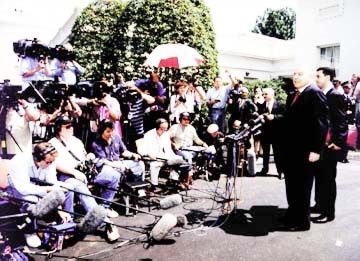|

Autumn 1997 (5.3)
Page 66
 Guest Editorial published in the Chicago Tribune,
August 5, 1997. Reprinted with the permission of the author. Guest Editorial published in the Chicago Tribune,
August 5, 1997. Reprinted with the permission of the author.
Halfway around the world at
the juncture of Russia, Iran, Armenia, Turkey, Georgia and the
Caspian Sea lies Azerbaijan, an energy-rich country the size
of South Carolina.
  Left: President Aliyev giving a press conference on
the White House lawn after meeting with President Clinton (August
1, 1997). Photo: Rafig Babayev. Left: President Aliyev giving a press conference on
the White House lawn after meeting with President Clinton (August
1, 1997). Photo: Rafig Babayev.
Heydar Aliyev, the president
of this newly independent Shiite Muslim nation, is in the midst
of a three-day visit to Chicago to meet with executives of Chicago-based
companies working in his country-Amoco, Hyatt Hotels, FMC and
Motorola-as part of his official visit to the United States.
Aliyev has influenced the destiny of Azerbaijan for almost 30
years. His career began with his 1969 appointment as First Secretary
of the Communist Party of Azerbaijan. He became a member of the
Politburo in 1982, but after the 1986 Chernobyl accident, he
fell out of favor with Soviet President Mikhail Gorbachev because
he argued against concealment of this international tragedy.
He resurfaced briefly in 1990 when hundreds of civilians were
killed in Baku, the capital of Azerbaijan, by Russian paratroopers
sent by Gorbachev to crush Azerbaijan's nascent independence
movement. His 1993 victory in the second democratic presidential
election that was held in Azerbaijan in 75 years has once more
made him guardian of his country's hard-fought independence.
There are many reasons America
should support Aliyev's vision of an independent Azerbaijan.
Energy Diversification
First, America's energy security requires diversification of
oil supplies coming into the U.S. With as much as 200 billion
barrels of reserves, the Caspian Sea area, second only to the
Persian Gulf in terms of oil reserves, can become a stable source
of oil for the West over the next 40 years. In fact, initial
oil projects signed thus far in Azerbaijan are expected to produce
more than 2 million barrels per day-roughly equivalent to what
the U.S. imports from OPEC's Arab members. Washington must aggressively
support a U.S.-Azerbaijan partnership forged on oil in order
to enhance the energy needs of the U.S.
Secularism
Second, Washington can strengthen its policy of isolating Iran
by forging even stronger political and economic ties with Baku,
because Azerbaijan continues to thwart the Iranian re-gime's
efforts at exporting Islamic fundamentalism to Azerbaijan. Although
Azerbaijan is a Shiite Muslim nation, Aliyev has striven to maintain
a secular character. "We are Muslims but will never allow
our country to become an Islamic state," he said. In the
face of intense Iranian pressure, Aliyev pushed for a constitution
in 1995 that calls for a separation of church and state. Furthermore,
he banned the activities of Azerbaijan's Iranian-sponsored Islamic
Party and resisted Iranian de-mands that Baku terminate friendly
relations with Israel. In retaliation, the Islamic regime has
forged strong ties with Azerbaijan's current ene-my, Christian
Armenia. In short, Iran views the U.S.-Azerbaijan partnership
as a threat to its borders.
Against Expansionism
Third, Aliyev's U.S. visit must be used to send a signal to Russia
that Washington will not tolerate any expansionist designs on
Azerbaijan. This expansionist tendency has exhibited itself in
the form of coup attempts against Aliyev, demands for veto power
over the Caspian Sea by questioning Azerbaijan's right to develop
its sector of this energy-rich body of water, and efforts to
create a unified Russian defense perimeter in the Caucasus Mountains.
The latest manifestation of Moscow's pressure on Baku was on
July 4 during Aliyev's official visit to Moscow when Russian
President Boris Yeltsin complained to his guest about Baku's
strong ties with Washington. Clearly, Russia views the U.S.-Azerbaijan
partnership, forged through oil, as a dual threat: Azerbaijan's
break from Russian domination and U.S. ascendancy in Russia's
traditional zone of influence.
Wrong Legislation
Fourth, relations between Baku and Wash-ington have been strained
by discriminatory U.S. legislation which makes Azerbaijan the
only country in the world forbidden by U.S. law from receiving
humanitarian assistance from the United States. Even Cuba, Libya,
North Korea, Iran and Iraq-all avowed adversaries of America,
are allowed to obtain U.S. humanitarian assistance. President
Clinton has questioned the appropriateness of this punitive legislation
against a country that has never made so much as a negative gesture
against America. Clinton should use Aliyev's visit as a challenge
to congressional leaders to repeal the ban and allow U.S. relief
assistance to the nearly 1 million refugees dislocated by the
war with Armenia. President Aliyev cannot sustain a pro-American
foreign policy-not to mention granting major oil concessions
to American oil companies-without an eventual domestic backlash
due to this distinctly un-American legislation.
Private Sector
Fifth, Clinton can showcase Azerbaijan as an example of how private-sector
America-not the American taxpayer-can help countries with centrally
planned economies make the transition to free market economies.
If the United States is to secure
its enduring national security interests, it must act in a more
farsighted and proactive manner to support Azerbaijan.
Dr. Rob Sobhani is a professor
at Georgetown University, Washington, D.C.
From
Azerbaijan
International
(5.3) Autumn 1997.
© Azerbaijan International 1997. All rights reserved.
Back to Index
AI 5.3 (Autumn 1997)
AI Home | Magazine
Choice
| Topics
| Store
| Contact
us
|
 Guest Editorial published in the Chicago Tribune,
August 5, 1997. Reprinted with the permission of the author.
Guest Editorial published in the Chicago Tribune,
August 5, 1997. Reprinted with the permission of the author.
